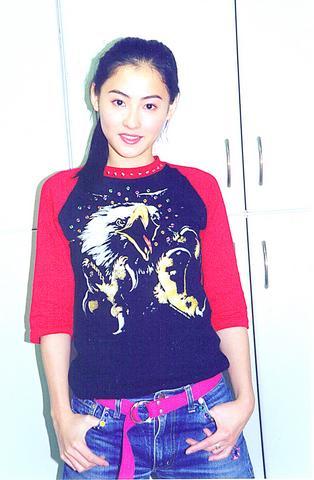The unrelenting character assassination of Cecilia Cheung (張柏芝) by the Hong Kong media seems to have rubbed off on the kids who should be her fans. On Monday night she and Andy Lau (劉德華) held a press conference to publicize the new movie Big Guy (
Not long ago, Cecilia was the media's sweetheart. So what brought about this spectacular fall from grace? Pop Stop recently reported that Hong Kong paparazzi had snapped shots of her with a voodoo doll, which was presumed to represent her ex Nicholas Tse (謝霆鋒). She's also been spotted dressed in bombastic clothes and made a big splash at a concert in China two weeks ago where she provocatively spread her legs in a choreographed routine not unlike Madonna's fabled Like a Virgin performance at the MTV Music Awards.
Given the chauvinistic standards of the gossip rags, her supposedly unseemly behavior has been attributed to her breakup. But the only truly odd behavior on her part, as far as Pop Stop can discern, was her retraction this week of an earlier announcement that she had a foreigner boyfriend, which was reported in Hong Kong's edition of the Apple Daily (蘋果日報) and in The Great Daily News (大成報) as yet another case of her having gone off the rails. It was all a joke, she said. Ha ha.

PHOTO: TAIPEI TIMES
Gigi Leung (梁詠琪) was reported in the current edition of Next Magazine (壹週刊) as having turned down a part in the next Johnny To (杜琪峰) film after the director had openly criticized her lackluster performance in Turn Left, Turn Right (向左走向右走), which he directed.
No matter how poorly He Li-hsiu (河莉秀) acts, the sultry South Korean starlet, whose main gimmick is that she started her life as a boy [and had a sex change], always overshadows the other actresses. Her limelight snatching rubbed actress Wu Pei-tsi (吳佩慈) up so badly this week that at a press conference about the show they both star in called Honey (親愛的), Wu lashed out complaining that she was, in fact, the star. "Why are her photos always so pretty [on the promotional posters] and the other actors' just ones taken at rehearsal?" Wu said. She even snapped at He's tendency to wear revealing blouses and dresses. "Ai ya, her chest can be made as big as she wants it to be."
This weekend's major pop event will be Lee Hom Wang's (

PHOTO: MAX WOODWORTH, TAIPEI TIMES
Tonight in front of the Presidential Office Shunza (順子) is billed to take the stage as part of the Double Ten Day celebrations. The selection of singers for any event related to celebrating Taiwan has been sensitive ever since A-mei (阿妹) was barred for a year from performances and product endorsements in China after she sang the national anthem at President Chen Shui-bian's (陳水扁) inauguration in 2000. But Shunza was quoted in local papers as saying she's "not scared at all" of any repercussions from across the strait. Easy for her to say, she has an American passport.

Under pressure, President William Lai (賴清德) has enacted his first cabinet reshuffle. Whether it will be enough to staunch the bleeding remains to be seen. Cabinet members in the Executive Yuan almost always end up as sacrificial lambs, especially those appointed early in a president’s term. When presidents are under pressure, the cabinet is reshuffled. This is not unique to any party or president; this is the custom. This is the case in many democracies, especially parliamentary ones. In Taiwan, constitutionally the president presides over the heads of the five branches of government, each of which is confusingly translated as “president”

Sept. 1 to Sept. 7 In 1899, Kozaburo Hirai became the first documented Japanese to wed a Taiwanese under colonial rule. The soldier was partly motivated by the government’s policy of assimilating the Taiwanese population through intermarriage. While his friends and family disapproved and even mocked him, the marriage endured. By 1930, when his story appeared in Tales of Virtuous Deeds in Taiwan, Hirai had settled in his wife’s rural Changhua hometown, farming the land and integrating into local society. Similarly, Aiko Fujii, who married into the prominent Wufeng Lin Family (霧峰林家) in 1927, quickly learned Hoklo (commonly known as Taiwanese) and

The Venice Film Festival kicked off with the world premiere of Paolo Sorrentino’s La Grazia Wednesday night on the Lido. The opening ceremony of the festival also saw Francis Ford Coppola presenting filmmaker Werner Herzog with a lifetime achievement prize. The 82nd edition of the glamorous international film festival is playing host to many Hollywood stars, including George Clooney, Julia Roberts and Dwayne Johnson, and famed auteurs, from Guillermo del Toro to Kathryn Bigelow, who all have films debuting over the next 10 days. The conflict in Gaza has also already been an everpresent topic both outside the festival’s walls, where

The low voter turnout for the referendum on Aug. 23 shows that many Taiwanese are apathetic about nuclear energy, but there are long-term energy stakes involved that the public needs to grasp Taiwan faces an energy trilemma: soaring AI-driven demand, pressure to cut carbon and reliance on fragile fuel imports. But the nuclear referendum on Aug. 23 showed how little this registered with voters, many of whom neither see the long game nor grasp the stakes. Volunteer referendum worker Vivian Chen (陳薇安) put it bluntly: “I’ve seen many people asking what they’re voting for when they arrive to vote. They cast their vote without even doing any research.” Imagine Taiwanese voters invited to a poker table. The bet looked simple — yes or no — yet most never showed. More than two-thirds of those